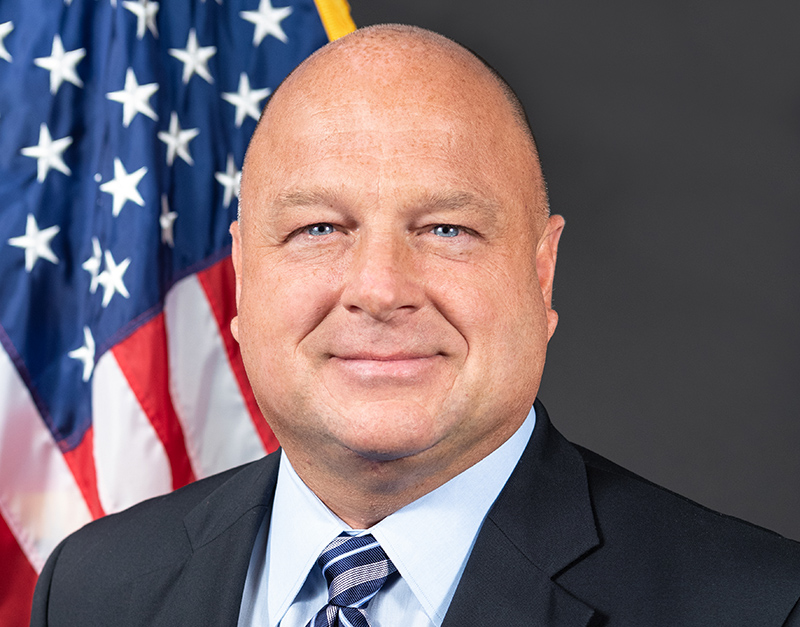Congressional Democrats Reintroduce the Equality Act
Sweeping civil rights bill seeking to protect LGBTQ people from discrimination has been co-sponsored by every single House Democrat.

Rep. Sharice Davids at a press conference announcing the reintroduction of the Equality Act in Congress – Photo: Office of Sen. Jeff Merkley
Congressional Democrats have reintroduced the Equality Act, a sweeping civil rights bill that would amend the Civil Rights Act to prohibit discrimination against LGBTQ people in employment, housing, credit, public accommodations, and other aspects of daily life.
At a Wednesday press conference hosted by Sen. Jeff Merkley (D-Ore.), the bill’s lead sponsor, several Democratic lawmakers and representatives from major LGBTQ rights organizations touted the bill’s importance — especially at a time when there appears to be a larger right-wing backlash against any form of LGBTQ visibility — and called upon their fellow lawmakers to pass the bill.
Given Democratic control of the Senate, it would not be surprising to see Senate Majority Leader Chuck Schumer (D-N.Y.) schedule a vote on the bill. However, it is unclear whether the measure would gain at least nine Republican votes to overcome a filibuster.
Additionally, Republican control of the House ensures that the measure will not be brought up for the remainder of the current Congress, unless six Republicans and all the chamber’s Democrats were to file a discharge petition to circumvent the committee process, an unlikely occurrence.
As such, the bill essentially serves as a “messaging” measure outlining the stark differences between where the majority of the Republican caucus stands on LGBTQ nondiscrimination laws and where congressional Democrats stand on the same issue.
“President Lyndon Johnson said that ‘freedom is a right to share…fully and equally in American society,’ ‘the right to be treated in every part of our national life as a person equal in dignity and promise to all others,'” Merkley said in prepared remarks. “We are here at this moment, when this is not the case in America.
“As the Human Rights Campaign has declared, we are in a state of emergency, characterized by expanding discrimination and increasing hate crimes,” Merkley added, referring to more than 500 bills introduced in various states seeking to curb or restrict LGBTQ individuals’ personal freedoms. “LGBTQ+ Americans, and especially trans youth, are experiencing life-threatening environments.”
Praising the work of at least 17 pro-LGBTQ organizations that helped lawmakers craft some of the bill’s provisions, as well as more than 500 corporations that have previously expressed support for the Equality Act in previous legislative sessions, Merkley sought to cast the bill as a measure that will grant opportunities to LGBTQ Americans.
Passing the Equality Act, he argued, allows LGBTQ people to live up to their full potential without facing unnecessary roadblocks — both institutional and personal — that would otherwise hinder their ability to succeed in life.
U.S. Rep. Mark Takano (D-Calif.), the lead sponsor of the House version of the bill, reflected on the progress that the LGBTQ community has enjoyed, especially in recent years, while also acknowledging a larger backlash, especially from far-right agitators, against the LGBTQ community in response to that progress.
“We cannot allow extremists in our country to once again normalize homophobia and attacks on LGBTQ people,” Takano said. “We can’t turn away from the discrimination that still exists for so many LGBTQ people today. We can’t and we won’t.
“And we will continue as a community to persevere through these challenges. We will create a safer world for us to thrive. We will pass the Equality Act and we will win.”
Takano told reporters that the language of the Equality Act, as introduced, is identical to the language contained in previous versions of the bill that passed the U.S. House of Representatives two separate times when Democrats controlled the chamber, and vowed to pass a “full-strength, undiluted Equality Act” into law.
Sen. Tammy Baldwin (D-Wis.), one of only two LGBTQ U.S. senators, urged her fellow lawmakers to pass the bill as soon as possible.
“In the majority of states, LGBTQ+ Americans left without fully inclusive nondiscrimination laws and can still face discrimination simply because of who they are, who they love, or what their family looks like,” Baldwin said. “No one should be denied an apartment, a job, federal aid, or anything else just because of who they are. And that’s why I’m so proud to join all of my colleagues today in introducing the Equality Act to ban discrimination against members of the LGBTQ community.”
House Minority Leader Hakeem Jeffries (D-N.Y.) celebrated the fact that every member of the House Democratic Caucus has signed on as a co-sponsor of the Equality Act, and said the legislation would be one of the party’s top priorities until it was finally passed into law.
Schumer, the top Senate Democrat, recounted how, last year, Democrats had successfully strategized on the timing of the Respect for Marriage Act, a bill ensuring same-sex marriages and interracial marriages are recognized and treated as valid by the federal government.
Taking a victory lap, Schumer noted that passage of the bill had at one time seemed highly unlikely, but members of the Democratic caucus were able to sufficiently amend the bill to attract enough Republican support to pass the measure, which President Biden signed into law last December.
House Speaker Emerita Nancy Pelosi (D-Calif.) and U.S. Sen. Cory Booker (D-N.J.) both invoked the memory of former U.S. Rep. John Lewis, a key historical figure in the U.S. Civil Rights Movement and longtime congressman from Georgia, who supported the Equality Act and saw it as an extension of the rights for which he spent decades fighting.
“We have this nation right now that professes the ideal of liberty and justice for all,” Booker said. “But where is the justice for all when you can be fired from your job in the majority of the states, just because you are gay? Where is the justice for all, where you can be denied a loan from a bank or precluded from public accommodations just because of who you are? This is an insult to our ideals. It is a continuing stain upon our pride as a country. This is not a cause just for the LGBTQ. It is the core of all Americans who believe in our ideals.”
“[A]s a black queer woman and leader in this movement. I shouldn’t have to determine if I’m being discriminated against because I’m black, queer or a woman,” said Kelley Robinson, the president of the Human Rights Campaign, which is backing the Equality Act. “Discrimination is discrimination and should be illegal under the law. That’s what the Equality Act is about.”
Support Metro Weekly’s Journalism
These are challenging times for news organizations. And yet it’s crucial we stay active and provide vital resources and information to both our local readers and the world. So won’t you please take a moment and consider supporting Metro Weekly with a membership? For as little as $5 a month, you can help ensure Metro Weekly magazine and MetroWeekly.com remain free, viable resources as we provide the best, most diverse, culturally-resonant LGBTQ coverage in both the D.C. region and around the world. Memberships come with exclusive perks and discounts, your own personal digital delivery of each week’s magazine (and an archive), access to our Member's Lounge when it launches this fall, and exclusive members-only items like Metro Weekly Membership Mugs and Tote Bags! Check out all our membership levels here and please join us today!




























You must be logged in to post a comment.